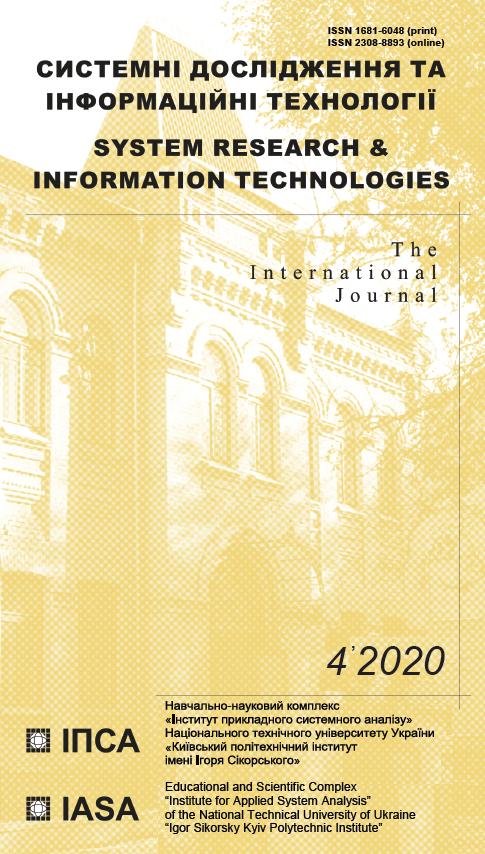Approximate guaranteed estimates for matrices in linear regression problems with a small parameter
DOI:
https://doi.org/10.20535/SRIT.2308-8893.2020.4.07Keywords:
linear estimation, unbiased estimates, guaranteed mean square error, linear operator equations, pseudo inverse matrices, small parameter, perturbed known observation matricesAbstract
The problem of finding linear unbiased estimates of the linear operator of unknown matrices — components of the observations vector, is investigated. It is assumed that the observation vector additively depends on a random vector with zero expected value, and the unknown correlation matrix belongs to a known bounded set. For the introduced class of linear estimates, necessary and sufficient conditions for the existence of solutions of operator equations that determine the unknown parameters of the vector estimate, are proved. The form of the guaranteed mean square error of the estimate is introduced on the sets of constraints of the problem parameters. The influence on the linear unbiased estimate of small perturbations of known rectangular matrices, which are the composites of the observations vector components, is also investigated. The analytical form is given through the parameters of the perturbed set of singularities for the introduced special operators that depend on a small parameter, which determine the corresponding operator equations, as well as their approximate solutions, in the first approximation of the small parameter method. A test example of solving the problem of finding a linear unbiased estimate under the condition of perturbation of both linearly independent and linearly dependent known observation matrices is presented.
References
A. Albert, Regression, pseudo inverse, recurrent evaluation. Moskow: Nauka, 1977, 305 p.
B.F. Arnold and P. Stanlecker,“Linear estimation in regression analysis using fuzzy prior information”, Rardom Oper. And Stoch. Equ, vol. 5, no. 2, pp. 105–116, 1997.
O. Nakonechnyi and J. Michalek,“Minimax estimates of linear parameters function in regression model under restraictions on parameters and variance-covariance matrix”, J.Comput.Appl.Math, no. 1(81), pp. 22–32,1997.
N. Christopeit and K. Helmes,“Linear minimax estimation with ellipsoidal constraints”, Acta Applicandae Mathematicae, 43, 1, pp.3–15,1996.
V. Girko,“Spektral Theory of Minimax Estirnation”, Acta applicandae mathematicae, 43,1, pp.59–69, 1996.
G. Trenkler and P. Stahlekecr,“Quasi minimax estimation in the linear regression model”, Statistics, 18, pp. 219–226, 1987.
N. Draper and H. Smith, Applied Regression Analysis. Publishing house “Williams”, 2007, 912 p.
D.I. Blokhintsev, Fundamentals of quantum mechanics. Moskow: Nauka, 1976, 864 p.
O.G. Nakonechnyi, G.I. Kudin, and T.P. Zinko, “Formulas of perturbation for one class of inverse operators”, Matematychni Studii, 52, no. 2. pp. 124–132, 2019.
O.G. Nakonechnyi, G.I. Kudin, P.M. Zinko, and T.P. Zinko,“Excitation method in problems of regression of a linear matrix”, International Scientific Technical Journal “Problems of Control and Informatics”, vol.1, pp. 38–47, 2020.

